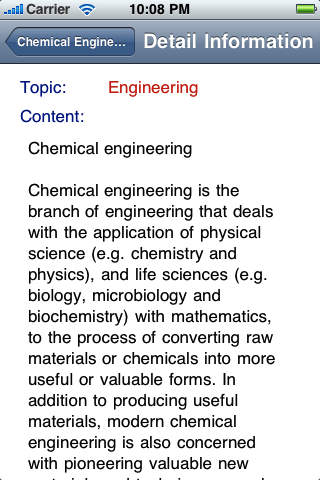
3-in-1 Chemical Engineering app for iPhone and iPad
Developer: Edward Choi
First release : 04 Jun 2010
App size: 351.11 Kb
1) Chemical engineering
Chemical engineering is the branch of engineering that deals with the application of physical science (e.g. chemistry and physics), and life sciences (e.g. biology, microbiology and biochemistry) with mathematics, to the process of converting raw materials or chemicals into more useful or valuable forms. In addition to producing useful materials, modern chemical engineering is also concerned with pioneering valuable new materials and techniques - such as nanotechnology, fuel cells and biomedical engineering.[1] Chemical engineering largely involves the design, improvement and maintenance of processes involving chemical or biological transformations for large-scale manufacture. Chemical engineers ensure the processes are operated safely, sustainably and economically. Chemical engineers in this branch are usually employed under the title of process engineer. A related term with a wider definition is chemical technology. A person employed in this field is called a chemical engineer.
2) Biotechnology
Biotechnology is a field of applied biology that involves the use of living things in engineering, technology, medicine, and other useful applications. Modern use of the term includes genetic engineering as well as cell- and tissue culture technologies. The concept encompasses a wide range (and history) of procedures for modifying living organisms according to human purposes - going back to domestication of animals, cultivation of plants, and "improvements" to these through breeding programs that employ artificial selection and hybridization. By comparison to biotechnology, bioengineering is generally thought of as a related field with its emphasis more on higher systems approaches (not necessarily altering or using biological materials directly) for interfacing with and utilizing living things. The United Nations Convention on Biological Diversity defines biotechnology as:
"Any technological application that uses biological systems, living organisms, or derivatives thereof, to make or modify products or processes for specific use."
3) Electrochemistry
Electrochemistry is a branch of chemistry that studies chemical reactions which take place in a solution at the interface of an electron conductor (a metal or a semiconductor) and an ionic conductor (the electrolyte), and which involve electron transfer between the electrode and the electrolyte or species in solution.
---- YOU CAN FIND THE INFORMATION CONTAINED IN THIS APPLICATION VIA THE NET AT WIKIPEDIA.COM AND KNOWLEDGE.HK----



